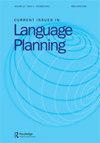语言教育政策中的个体能动性:多语种布鲁塞尔中国传统语言学校的故事
IF 1.8
1区 文学
Q2 EDUCATION & EDUCATIONAL RESEARCH
引用次数: 0
摘要
代理在语言教育政策的形成和学习过程的影响中起着至关重要的作用。关于代理的研究尚未充分涉及散居者的遗产教育和维护领域。借鉴Shohamy和Bonacina-Pugh对语言政策声明、感知和实践的概念化,我们研究了三组参与者的个体代理——有权力的人(校长)、有专业知识的人(教师)和有兴趣的人(学生)——在布鲁塞尔两所中国传统语言学校的各种政策或规划活动中。基于收集的民族志数据,结合课堂互动录音的对话分析,我们的研究结果说明了三种类型的代理角色如何有效地形成语言政策和构建CHL学校内的话语空间,并具有从单语到多语的明确方向转变。本研究通过描绘教育从业者和学习者如何行使他们的权力来探索适合当地的语言政策,从而最大限度地发挥行动者教授和学习遗产语言的潜力,有助于在高度多语言、散居和教育背景下的遗产语言维护研究。关键词:个体机构;教育语言政策;中国传统语言;;衷心感谢École比利时中山中学和布鲁塞尔欧中汉语学校的所有校长、老师和学生,感谢他们在我博士学习期间接受我的采访和观察。不用说,这项工作中的任何错误都是我们的责任。披露声明作者未报告潜在的利益冲突。本研究由中国国家留学基金委资助项目[201607110011]、上海市浦江计划资助项目[22PJC111]和中央高校基本科研业务费专项资金[22120230347]资助。作者简介李祥云,同济大学外国语学院博士后。她的主要研究兴趣包括语言规划和政策、多语言、语言维护和散居环境下的传统语言教育。xiangyun.li@hotmail.comQi沈奇,上海同济大学语言规划与全球治理研究中心主任,教授。主要研究方向为语言规划与政策、教育语言学、社会语言学。qishen@tongji.edu.cn本文章由计算机程序翻译,如有差异,请以英文原文为准。
Individual agency in language-in-education policy: a story of Chinese heritage language schools in multilingual Brussels
ABSTRACTIt is increasingly recognized that agency plays an essential role in shaping language-in-education policy (LEP) and influencing the learning process. Research on agency has not yet adequately engaged with the field of heritage education and maintenance in diasporas. Drawing on Shohamy’s and Bonacina-Pugh’s conceptualization of declared, perceived, and practiced language policies, we examine the individual agency of three groups of actors – people with power (principals), people with expertise (teachers), and people with interest (students) – in a variety of policy or planning activities within two Chinese heritage language (CHL) schools in Brussels. On the basis of collected ethnographically informed data in conjunction with the conversation analysis of audio-recorded classroom interactions, our findings illustrate how three types of agentive roles are effective in forming language policies and constructing discursive spaces within the CHL schools, with a clear orientation shift from monolingualism to multilingualism. This study contributes to research on heritage language maintenance in a highly multilingual, diasporic, and educational context by providing a portrait of how educational practitioners and learners assert their agency to explore locally appropriate language policies that maximize actors’ potential to teach and learn heritage languages.KEYWORDS: Individual agencylanguage-in-education policychinese heritage languagemonolingualismmultilingualism AcknowledgmentI am very grateful to Dr Rik Vosters and Dr Jianwei Xu for supervising my doctoral thesis. My sincere thanks also go to all the principals, teachers, and students of the École Sun Yat-Sen de Belgique and the Eurochine Chinese Language School in Brussels, who kindly accepted my invitation to interview and observe them during my Ph.D. study. Needless to say, any errors that remain in this work are our sole responsibility.Disclosure statementNo potential conflict of interest was reported by the author(s).Additional informationFundingThis work was sponsored by the China Scholarship Council (CSC) under grant number [201607110011], Shanghai Pujiang Program under grant number [22PJC111], and Fundamental Research Funds for the Central Universities [22120230347].Notes on contributorsXiangyun LiXiangyun Li is a post-doc at the School of Foreign Languages, Tongji University. Her main research interests include language planning and policy, multilingualism, language maintenance, and heritage language education in diaspora settings. xiangyun.li@hotmail.comQi ShenQi Shen is a full professor and director of the Center for Language Planning and Global Governance, at Tongji University, Shanghai, China. His research interests include language planning and policy, educational linguistics, and sociolinguistics. qishen@tongji.edu.cn
求助全文
通过发布文献求助,成功后即可免费获取论文全文。
去求助
来源期刊

Current Issues in Language Planning
Multiple-
CiteScore
4.80
自引率
16.70%
发文量
26
期刊介绍:
The journal Current Issues in Language Planning provides major summative and thematic review studies spanning and focusing the disparate language policy and language planning literature related to: 1) polities and language planning and 2) issues in language planning. The journal publishes four issues per year, two on each subject area. The polity issues describe language policy and planning in various countries/regions/areas around the world, while the issues numbers are thematically based. The Current Issues in Language Planning does not normally accept individual studies falling outside this polity and thematic approach. Polity studies and thematic issues" papers in this journal may be self-nominated or invited contributions from acknowledged experts in the field.
 求助内容:
求助内容: 应助结果提醒方式:
应助结果提醒方式:


